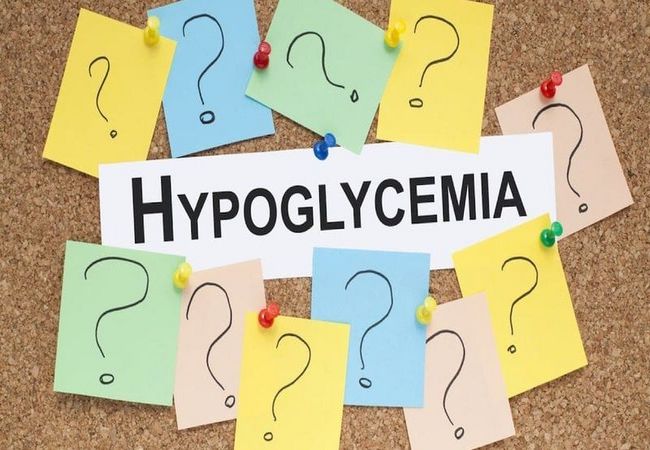Definition of Hypoglycaemia:
When blood glucose level is below 3.5 mmol/ L then it is called hypoglycaemia. It occurs in a patient who is treated by insulin or sulphonylurea & not a manifestation of the disease itself.

Causes of Hypoglycemia:
It includes-
- Missed, delayed or inadequate meal,
- Unexpected or unusual exercise,
- Alcohol,
- Errors in oral hypoglycemic agent or insulin dose/schedule/administration,
- Poorly designed insulin regimen, particularly if predisposing to nocturnal hyperinsulinaemia,
- Lipohypertrophy at injection sites causing variable insulin absorption,
- Gastroparesis due to autonomic neuropathy,
- Mal-absorption, eg. celiac disease,
- Unrecognized other endocrine disorder, eg. Addison’s disease,
- Factitious (deliberately induced),
- Breastfeeding by diabetic mother.
Management of Hypoglycaemia:
Clinical features:
- Usually rapid onset,
- May be preceded by odd behavior (eg. aggression),
- Sweating, increase pulse, seizures.
Common symptoms of hypoglycemia:
Autonomic:
- Sweating,
- V Trembling,
- Pounding heart,
- Hunger,
- Anxiety.
Neuroglycopenic:
- Confusion,
- Drowsiness,
- Speech difficulty.
Inability to concentrate, Incoordination
Non-specific:
- Nausea,
- Headache,
- Tiredness
Investigation:
- Blood glucose: very low
- Urine examination: No glycosuria, no ketonuria
Treatment of Hypoglycemia:
- Give 50 ml 50% dextrose IV state. This harms veins, so follow by 0.9% saline flush. Expect prompt recovery.
- If not recovered, give dexamethasone 4 mg/4hour IV to combat cerebral oedema after prolonged hypoglycemia.
- A continuous IV infusion of dextrose (5% or 10%) may be necessary to prevent recurrent of hypoglycemia.
- If IV access fails try glucagon 1-2 mg.
- On regaining consciousness give sugary drinks.
Risk Factors of Severe Hypoglycemia:
It includes the following:
- Strict glycaemic control,
- Impaired awareness of hypoglycemia,
- Age (very young and elderly),
- Increasing duration of diabetes,
- Sleep,
- C-peptide negativity,
- History of previous hypoglycemia,
- Renal impairment,
- Angiotensin converting enzyme (ACE) genotype.
Difference Between Hypoglycemic Coma and Hyperglycemic Coma:
Point of Differences | Hypoglycemic Coma | Hyperglycemic Coma |
History | · · · · | · · · · |
Onset | In minutes | Over hours or days |
Symptoms | Vomiting (occasionally) | Abdominal pain and vomiting |
Signs | · · · · · · | · · · · · · |
Urine | No ketonuria | Ketonuria, glycosuria |
Blood | · · | · · |
IV glucose | Good response | No response |

Maria Khatun Mona is a Founder and Editor of Nursing Exercise Blog. She is a Nursing and Midwifery Expert. Currently she is working as a Registered Nurse at Evercare Hospital, Dhaka, Bangladesh. She has great passion in writing different articles on Nursing and Midwifery. Mail her at “maria.mona023@gmail.com”

Great!